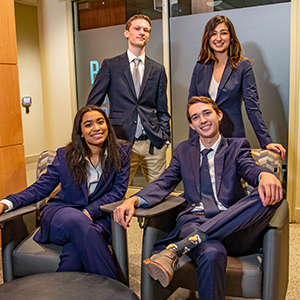
Competition teaches students that it pays to be ethical (literally!)
Dec. 3, 2019 - Wendy MartinOff-duty conduct, sexual harassment, professional accountability, confidentiality and journalistic ethics were at the heart of the second annual VCU School of Business Ethics Competition presented by Altria. On November 15, five teams of finalists presented their cases to a five-person panel of VCU alumni judges. Their extra-curricular efforts were rewarded with cash prizes that exceeded $10,000.
“I was absolutely impressed,” said Timmy Nguyen, a 2011 business administration and management graduate who volunteered as judge. “The students in every group did a tremendous job. They did their research and offered creativity in their recommendations on how to impose discipline and to strengthen policies. They also demonstrated an understanding of law and the need to have standards of accountability.”
Enterprising team credits professor for success
The first-place team consisted of three freshman students, Julia Duxbury, Brian Glessner and Shaiann Sarkhosh, and one junior, Joe Teegarden. As finalists, the group worked together seamlessly and professionally, taking turns to present a tight recap of the case’s ethical dilemmas, outlining potential impacts to the business and its varied stakeholders, offering solutions as to how to discipline employees and then detailing steps to strengthen company policies to reduce and simplify similar ethical situations in the future.
Only later, when celebrating their win at the post-competition reception, did the exuberant team exhibit their youth and resourcefulness.
Asked if the team had intentionally worn matching navy suits, Sarkhosh replied in the affirmative and then laughed that her own pants were held up at the back by a safety pin. Her entire outfit – a sharp-looking navy pantsuit and crisp, white shirt – was on loan from Suit Yourself, a professional closet managed by VCU Career Services.
“We tried to get something for Brian there, but they didn’t have anything in his size,” grinned Duxbury, who admitted that her own navy pantsuit belongs to her mom, who had driven from Charlottesville to deliver it.
The team’s success, they went on to explain, was no fluke. “This week we met for two to four hours every day. The weeks before that, to prepare the white paper, we met one to two days a week,” said Sarkhosh. The team conducted online research, scoured the Ethical Journalism Network page for guidance and even consulted lawyers.
All enthusiastically named “Winning Presentations” as the class most responsible for their win and eagerly spelled out the full name of their professor, Marisa Guida. The four met and learned of the competition in her class. Two team members, Sarkhosh and Teegarden, credited high school experience with DECA chapters as being helpful to their win.
Finalist teams split cash prizes of varying amounts -- $4,000 for first place, $3,000 for second place, $2,000 for third place, $1,000 for fourth place and $500 for fifth place.
Sarkhosh plans to use her $1,000 to buy Christmas gifts and also intends to invest a portion in the stock market. “Brian is great with stocks,” she said admiringly of her teammate.
Ethics at VCU – Then and Now
Alumni judges agreed that, while the Ethics Competition was only in its second year, ethics has long been an important topic of instruction at VCU.
Judge Ellen Hwang graduated from the VCU School of Business in 2016 with a degree in accounting and today works for the Virginia Credit Union. “Our major focused on ethical issues, especially after the Enron scandal. We discussed things that may or may not be black and white legally, but that you still have to make judgment calls on.
“The School of Business has always done a good job of making sure ethics is a continuing conversation, but this competition really puts a spotlight on it for all majors. Most people don’t like to think about the consequences of judgments based on ethical values. I think this competition reminds people that, at some point, you may be presented with circumstances that you can’t just shoo away and have them stay away. It forces people to think about business ethics, and anticipate that they might be part of a solution.”
How the competition worked
In late September, more than 17 interdisciplinary teams of four to five undergraduate students submitted applications to compete. According to competition organizer Cait Burns, business attire was required at the competition kickoff where students received a brief tutorial and tips as well as the case study outlining two distinct incidents of alleged unethical behavior by employees of a fictional software development company that employed 21,000 people with main offices in Washington, D.C. and California.
For the first round of competition, students were required to submit a one-to-two-page white paper answering the ethical dilemma case questions. Two weeks later, organizers notified all participants of the names of the five teams selected as finalists. Those teams had an additional two weeks to prepare a 10-minute presentation that involved all team members followed by a Q&A session.
Alumni judges included Ellen Hwang, Chad Krouse, Timmy Nguyen, Sandy Sizemore and Jarreau Wiles. Only months ago, Sizemore announced her decision to create an endowed economics scholarship in memory of her late husband and to bequeath half of the couple’s estate to VCU Athletics and the VCU School of Business.
